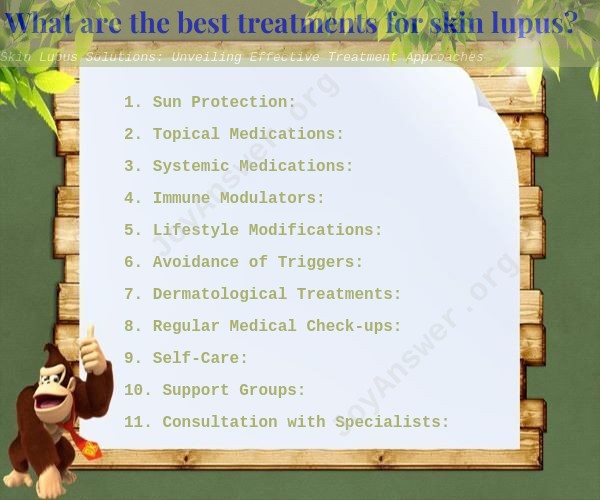What are the best treatments for skin lupus?
The treatment of skin lupus, also known as cutaneous lupus erythematosus (CLE), involves a combination of medical, lifestyle, and preventive measures. The specific treatment approach will depend on the type and severity of skin lupus, as well as individual factors. Here are some effective treatment approaches:
1. Sun Protection:Since sun exposure can exacerbate skin lupus symptoms, sun protection is essential. This includes using broad-spectrum sunscreen with high SPF, wearing protective clothing, and avoiding direct sunlight during peak hours.
2. Topical Medications:For mild cases of skin lupus, topical corticosteroids, calcineurin inhibitors, or antimalarial creams (e.g., hydroxychloroquine) might be prescribed to manage inflammation and reduce skin symptoms.
3. Systemic Medications:For more severe cases, systemic medications such as antimalarial drugs (hydroxychloroquine), corticosteroids (oral or injectable), or immunosuppressive drugs may be recommended to control inflammation and modulate the immune response.
4. Immune Modulators:Immunomodulating medications like immunomodulatory agents and biologics might be used for refractory cases. These medications help regulate the immune response and reduce inflammation.
5. Lifestyle Modifications:Maintaining a healthy lifestyle with balanced nutrition, regular exercise, stress management, and adequate sleep can contribute to overall well-being and potentially help manage skin lupus symptoms.
6. Avoidance of Triggers:Identifying and avoiding triggers that worsen symptoms, such as certain medications, stress, or exposure to specific environmental factors, can be beneficial.
7. Dermatological Treatments:Dermatological treatments like phototherapy (light therapy) or laser therapy might be used to manage skin lesions and improve skin appearance.
8. Regular Medical Check-ups:Regular follow-up appointments with dermatologists or rheumatologists are important to monitor the progress of treatment, adjust medications as needed, and manage any potential side effects.
9. Self-Care:Practicing gentle skin care, avoiding harsh soaps and cosmetics, and using moisturizers can help manage skin dryness and discomfort.
10. Support Groups:Joining support groups or connecting with others who have skin lupus can provide emotional support, share experiences, and offer coping strategies.
11. Consultation with Specialists:Collaborating with a dermatologist, rheumatologist, or other medical specialists experienced in treating lupus is crucial to receive personalized care.
It's important to note that treatment plans should be tailored to individual needs, and what works for one person may not be suitable for another. Always consult with a medical professional before making any treatment decisions or changes. Early intervention and effective management can help individuals with skin lupus lead a better quality of life.













